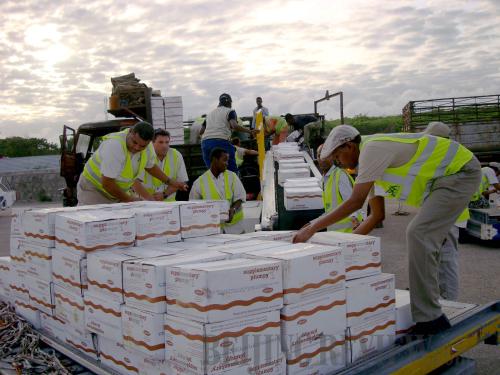|
 |
|
HELP ARRIVES: Workers unload the World Food Program's first airlifted humanitarian food aid to famine-ravaged Somalia in Mogadishu on July 27 (XINHUA/AFP) |
Further famine will break out unless underlying food security problems are addressed, an arduous task that calls for the joint efforts of African countries and the rest of the world.
The African continent has 190 million hectares of farmland. Because of poor agricultural infrastructure, irrigated land accounts for less than 5 percent of the total. As a result of the lack of irrigation facilities, coupled with backward agricultural technology, the per-unit yield of farmland in Africa is less than half the world average.
The food self-sufficiency ratio in Africa is around 70 percent. While corn output can largely meet regional needs, Africa relies on imports to satisfy 45 percent of its wheat demand and 80 percent of its rice demand. A famine will ensue if there is a major natural disaster or if plummeting cash crop prices reduce African countries' purchasing power for food.
Food problems have plagued the African continent since its independence. Famines in Northeastern Africa in 1984 and in Somalia in 1992 still conjure up miserable memories. In recent years, rising international food prices have aggravated African countries' food shortages. The FAO Food Price Index rose 24 percent in 2007 over the previous year, and the index average for the first three months of 2008 was 53 percent higher than in the same period in 2007.
Soaring food prices have plunged many African countries into food crises. More than 40 out of the 54 African countries suffer food shortages. Over the past three years, high food prices have sparked unrest in a number of countries including Cameroon, Burkina Faso, Senegal, Cote d'Ivoire and Mozambique.
Rapid population growth is another major reason for Africa's food shortages. Africa's population has increased seven-fold in the past 110 years, climbing from 141 million in 1900 to 278 million in 1960, and more than 1 billion in 2010. The growth not only is unprecedented in other parts of the world, but also has far outpaced increases in food production in Africa. An FAO report said the population explosion has led to an increase in the number of undernourished people in the sub-Saharan region from 169 million in the early 1990s to 212 million today.
Given its underdeveloped economy, Africa finds itself at a disadvantaged position in economic globalization. Industrialized countries not only possess advanced agricultural technology, but also grant subsidies to farmers. Their highly competitive products have had a devastating impact on African countries' agricultural industries, dampening African farmers' initiative in grain production.
More alarmingly, European and U.S. investors have purchased more than 30 million hectares of land—half the area of France—in Africa to plant cash crops or develop alternative energy.
Potential solutions
The world community, especially developed countries, is obligated to lend a helping hand to African countries. The UN has called for $2.4 billion in humanitarian assistance for famine-affected countries in the Horn of Africa. But committed assistance has amounted to only $1.1 billion to date. The African Union (AU) held a fundraising conference in Addis Ababa, Ethiopia, on August 25 in the hope of collecting $500 million in donations.
As a major emerging economy, China has shown deep concern for the famine in East Africa. While holding talks with visiting Ethiopian Prime Minister Meles Zenawi in Beijing on August 15, Chinese Premier Wen Jiabao said China would provide an additional 353.2 million yuan ($55.28 million) in emergency food aid to Ethiopia and other drought-hit African countries. Earlier, in late July, China promised to provide 90 million yuan ($14 million) in food assistance to those countries.
Long-term plans should be made to resolve food problems in Africa. African countries should invest more in agricultural infrastructure, including irrigation facilities, to lessen the impact of natural disasters. Investment plans, however, can materialize only when Africa achieves economic development and political stability, despite African countries' consensus on the importance of boosting agriculture.
The author is a research fellow with the Center for West Asian and African Studies at the Shanghai Institutes for International Studies
China's Commitment
At the Beijing Summit of the Forum on China-Africa Cooperation (FOCAC) in 2006, the Chinese Government said it would send 100 senior agricultural experts to Africa and establish 10 agricultural technology demonstration centers in three years. This project was completed within schedule.
At the Fourth Ministerial Conference of the FOCAC in 2009 in Sharm el-Sheikh, Egypt, China further announced it would set up another 10 agricultural technology demonstration centers in Africa, send 50 agricultural technology teams to Africa and train 2,000 agricultural technicians for African countries in the next three years. | 